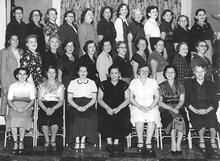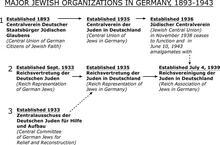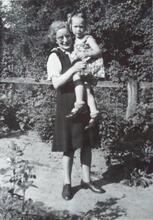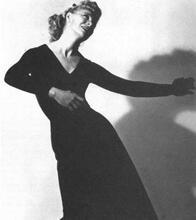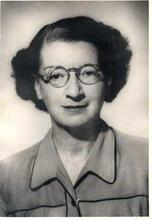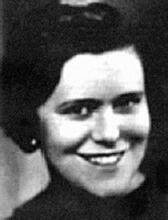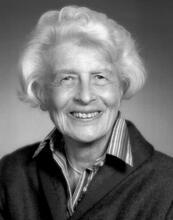Hilda Geiringer
Hilda Geiringer studied mathematics and physics at the University of Vienna where she wrote a groundbreaking doctoral dissertation. In 1921, she became a research assistant to Richard von Mises, director of the Institute of Applied Mathematics in Berlin, who would later become her collaborator and her husband. Geiringer taught at the University of Berlin but was dismissed from her job because of Nazi anti-Jewish legislation. She fled to Turkey in 1933, where she was a professor of mathematics in Istanbul. Geiringer immigrated to the United States in 1939, where she taught at Bryn Mawr College and did classified research for the National Defense Research Council. In 1944, she became a professor and department chair at Wheaton College. Despite her accomplishments, after immigrating to the United States, Geiringer could only find jobs at women’s colleges.
Early Life and Education
Hilda Geiringer’s life epitomizes both the successes and frustrations of women in academia in the early twentieth century. A pioneering applied mathematician, she was the first woman to receive an academic appointment in mathematics at the University of Berlin. Despite her distinguished publications, after immigrating to the United States, she could find jobs only at women’s colleges.
The second of four children and the only daughter, Hilda Geiringer was born in Vienna on September 28, 1893, to a middle-class Jewish family. Her mother, Martha Wertheimer Geiringer, was from Vienna; her father, Ludwig Geiringer, was a textile manufacturer from Slovakia. A brilliant student with a prodigious memory, she studied mathematics and physics at the University of Vienna from 1913 to 1917 and wrote a groundbreaking doctoral dissertation on double trigonometric (Fourier) series.
In 1921, after teaching adult education and working as an associate editor for a mathematics journal, Geiringer received a research position as the assistant to Richard von Mises, the director of the Institute of Applied Mathematics in Berlin. Von Mises, a Catholic of Jewish origin, became her mentor, collaborator, and eventually her second husband. Also in 1921, Geiringer married another Jewish mathematician from Vienna, Felix Pollaczek, and in 1922 gave birth to a daughter, Magda. After the couple separated in 1925, Geiringer raised her daughter alone. The divorce was not finalized until 1932.
Leaving Nazi Germany and Later Career
In 1927, Geiringer became a privatdocent in applied mathematics at the University of Berlin and continued to conduct research on probability and the mathematical theory of plasticity. In 1933, instead of an anticipated promotion to untenured associate professor (Extraordinarius), a rank attained by very few women in Germany, she was dismissed from her job as a result of Nazi anti-Jewish legislation. She left Germany with her daughter and, after spending a year as a research associate at the Institute of Mechanics in Brussels, became professor of mathematics at the University of Istanbul in 1934. Together with von Mises, she remained in Turkey for five years, lecturing first in French and then in Turkish.
In 1939, Geiringer was offered a temporary position as a lecturer at Bryn Mawr College, which enabled her to immigrate to the United States with her daughter on a nonquota visa. During World War II, she did classified research for the National Defense Research Council. In 1944, she married von Mises, who was a professor at Harvard, and received an appointment as professor of mathematics and department chair at Wheaton, a women’s college in Norton, Massachusetts, a position she held until her retirement in 1959.
Hilda Geiringer became an American citizen in 1945 and no longer identified herself as a Jew but as a Unitarian. Although she was a dedicated teacher, a prolific researcher, and a Protestant, as a woman already in her fifties, Geiringer found it impossible to obtain an academic appointment in Boston and thus could not live together with her husband except on weekends and vacations. After von Mises’s death in 1953, she completed and edited his unpublished works on probability and statistics while continuing to do research in this field herself.
Hilda Geiringer died of pneumonia on March 22, 1973, while on a visit to California.
American Men of Science (1944): 635.
Biermann, K.-R. Die Mathematik und ihre Dozenten an der Berliner Universität 1810–1933 (1988).
Binder, Christa. “Hilda Geiringer: ihre ersten Jahre in Amerika.” In Amphora, edited by Sergei S. Demidov et al. (1992): 25–53.
Boedeker, Elisabeth, and Maria Meyer-Plath, eds. 50 Jahre Habilitation von Frauen in Deutschland (1974).
Dresden, A. “The Migration of Mathematicians.” American Mathematical Monthly 49 (1942): 415–429.
Duren, P., ed. A Century of Mathematics in America (1988); Frank, Wilhelm.
“Richard von Mises und Hilda Geiringer-Mises.” Vertriebene Vernunft 2 (1987): 753–757.
Geiringer, Hilda, and Richard von Mises. Papers. Harvard University Archives, Cambridge, Mass.
Humboldt University Archives, Berlin, Habilitationen #1242 (1925).
International Biographical Dictionary of Central European Emigres. Vol. 2, part 2 (1980): 821.
Mathematical Reviews. Cumulative Author Indexes (1940–1979); NAW modern.
Obituary. NYTimes, March 24, 1973.
Pinl, M., and L. Fürtmüller. “Mathematicians under Hitler.” Leo Baeck Institute Year Book 18 (1979): 131–182.
Poggendorff, J.C. Biographisch-literarisches Handworterbuch der exakten Naturwissenschaften (1923–1931 and 1932–1953).
Richards, Joan L. “Hilda Geiringer von Mises (1893–1973).” In Women of Mathematics. A Bibliographic Sourcebook, edited by L.S. Grinstein and P.J. Campbell (1989): 41–46.
Rossiter, Margaret W. Women Scientists in America Before Affirmative Action 1940–1972 (1995); Tisza, Magda. Conversation with author, 1993.
Zentralblatt der Mathmatik und ihre Grenzgebiete. Cumulative Author Index to Vols. 1–25 (1930–1940).



